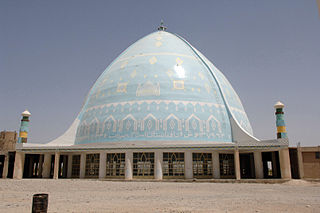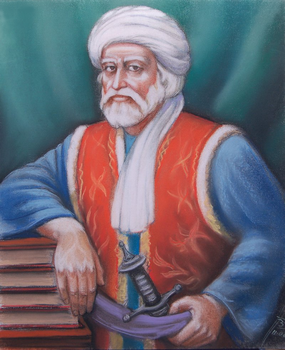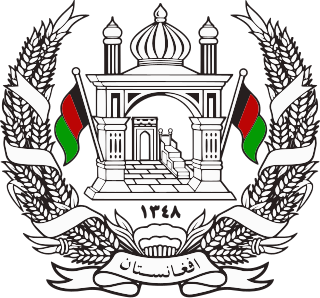This is a list of Pashto language poets.

Kandahar is a city in Afghanistan, located in the south of the country on the Arghandab River, at an elevation of 1,010 m (3,310 ft). It is Afghanistan's second largest city after Kabul, with a population of about 614,118. It is the capital of Kandahar Province and the centre of the larger cultural region called Loy Kandahar. Kandahar is the founding city and spiritual center of the Taliban. Despite the capital of Afghanistan being Kabul, where the government administration is based, Kandahar is the seat of power in Afghanistan as the supreme leader and his spiritual advisers are based there. Kandahar has therefore been called the de facto capital of Afghanistan, though the Taliban maintain Kabul is the capital.

Pashto is an Eastern Iranian language in the Indo-European language family, natively spoken in northwestern Pakistan, southern and eastern Afghanistan, and some isolated pockets of far eastern Iran near the Afghan border. It has official status in Afghanistan and the Pakistani province of Khyber Pakhtunkhwa. It is known in historical Persian literature as Afghani.

Kandahār is one of the thirty-four provinces of Afghanistan, located in the southern part of the country, sharing a border with Pakistan, to the south. It is surrounded by Helmand in the west, Uruzgan in the north and Zabul Province in the east. Its capital is the city of Kandahar, Afghanistan's second largest city, which is located on the Arghandab River. The greater region surrounding the province is called Loy Kandahar. The Emir of Afghanistan sends orders to Kabul from Kandahar making it the de facto capital of Afghanistan, although the main government body operates in Kabul. All meetings with the Emir take place in Kandahar, meetings excluding the Emir are in Kabul.
The Khattak tribe are a prominent Pashtun tribe located in the Khattak territory, which consists of Karak, Nowshera, Kohat districts of Khyber Pakhtunkhwa, Pakistan.

Khošāl Khān Khaṭak (Pashto: خوشال خان خټک; Urdu, Persian: خوشحال خان خٹک; 1613 – 25 February 1689), also known as Khushal Baba, was a 17th-century Pashtun poet, chief, and warrior. Khushal Khan served the Mughal Empire protecting them from Pashtun warriors over most of his lifespan. After being expelled from his tribal chiefdom and replaced with his son by his Mughal superiors, Khushal Khan turned against the Mughals. Afterwards, Khushal preached the union of all Pashtuns, and encouraged revolt against the Mughal Empire, promoting Pashtun nationalism in the last years of his life through poetry. Khushal wrote many works in Pashto but also a few in Persian. Khushal is considered the "father of Pashto literature" and the national poet of Afghanistan.

Nowshera District is a district in the Peshawar Division of the Khyber Pakhtunkhwa province of Pakistan. The capital and district headquarter is Nowshera city.
Pakistan’s tradition of poetry includes Urdu poetry, English poetry, Sindhi poetry, Pashto poetry, Punjabi poetry, Saraiki poetry, Baluchi poetry, and Kashmiri poetry. Sufi poetry has a strong tradition in Pakistan and the poetry of popular Sufi poets is often recited and sung.

The Hotak dynasty was an Afghan monarchy founded by Ghilji Pashtuns that briefly ruled portions of Iran and Afghanistan during the 1720s. It was established in April 1709 by Mirwais Hotak, who led a successful rebellion against the declining Persian Safavid empire in the region of Loy Kandahar in what is now southern Afghanistan.
Abdur Rahmān Momand or Rahmān Bābā, was a renowned Pashtun Sufi Dervish and poet from Peshawar during the Mughal era. He, along with his contemporary Khushal Khan Khattak, is considered to be one of the most popular poets of the Pashto language. His poetry expresses the mystical side of Islam, in line with his Sufi-oriented nature.
Bāyazīd Khān Ansārī, commonly known as Pīr Rōshān or Pīr Rōkhān, was an Ormur warrior, Sufi poet and revolutionary leader. He wrote mostly in Pashto, but also in Persian, Hindustani and Arabic, while his mother tongue was Ormuri. He is known for founding the Roshani movement, which gained many followers in the Pashtunistan region, in present-day Pakistan and Afghanistan, and produced numerous Pashto poets and writers.
Amir Hamza Khan Shinwari, commonly known as Hamza Baba was a prominent Pashto and Urdu language poet, playwright and author. His works are studied at Master-level at the University of Peshawar. He is considered a bridge between classic Pashto literature and modern forms. He founded the Khyber School in Pashto literature. A number of notable poets of this school, such as Nazir Shinwari, Khatir Afridi, and Khyber Afridi were his pupils.

Pashto literature refers to literature and poetry in Pashto language. The history of Pashto literature spreads over five thousands years having its roots in the oral tradition of Tappa. However, the first recorded period begins in 7th century with Amir Kror Suri. Later, Pir Roshan (1526–1574), who founded his own Sufi school of thoughts and began to preach his beliefs. He gave Pashto prose and poetry a new and powerful tone with a rich literary legacy. Khair-ul-Bayan, oft-quoted and bitterly criticized thesis, is most probably the first book on Sufism in Pashto literature. Among his disciples are some of the most distinguished poets, writers, scholars and sufis, like Arzani, Mukhlis, Mirza Khan Ansari, Daulat and Wasil, whose poetic works are well preserved. Akhund Darweza (1533–1615), a popular religious leader and scholar gave a powerful counterblast to Bayazid’s movement in the shape of Makhzanul Islam. He and his disciples have enriched the Pashto language and literature by writing several books of prose.

Alakozai is a Pashtun tribe in Afghanistan. They are one of the four tribes of the Zirak tribal confederacy of Durrani Pashtuns.

The Barakzai dynasty also known as the Muhammadzai dynasty ruled modern day Afghanistan from 1823 to 1978 when the monarchy ended de jure under Musahiban Mohammad Zahir Shah and de facto under his cousin Sardar Mohammad Daoud Khan. The Barakzai dynasty was established by Dost Mohammad Khan after the Durrani dynasty of Ahmad Shah Durrani was removed from power. As the Pahlavi era in Iran, the Muhammadzai era was known for its progressivist modernity in which Afghanistan was referred to as the "Switzerland of Asia".
Akora Khattak or Sarai Akora is a town in the Jehangira tehsil of the Nowshera District in the Khyber Pakhtunkhwa province of Pakistan. Its location is adjacent to the Kabul River, which converges with the Indus River about 15 kilometres downstream. Neighbouring places are Nowshera Cantonment to the west and Jahangira town to the east.
Pashtun nationalism is an ideology that claims that the Pashtuns form a distinct nation and that they should always be united to preserve their culture and homeland. In Afghanistan, those who advocate Pashtun nationalism favour the idea of a "Greater Afghanistan", which includes Khyber Pakhtunkhwa, and be ruled directly under Pashtun principles.

Abdul-Hai Habibi was a prominent Afghan historian for much of his lifetime as well as a member of the National Assembly of Afghanistan during the reign of King Zahir Shah. A Pashtun nationalist from Kakar tribe of Kandahar, Afghanistan, he began as a young teacher who made his way up to become a writer, scholar, politician and Dean of Faculty of Literature at Kabul University. He is the author of over 100 books but is best known for editing Pata Khazana, an old Pashto language manuscript that he claimed to have discovered in 1944; but the academic community does not unanimously agree upon its genuineness.
Nāzo Tokhī, commonly known as Nāzo Anā, was an Afghan poet and writer in the Pashto language. Mother of the famous early-18th century Afghan king Mirwais Hotak, she grew up in an influential family in the Kandahar region. She is remembered as a brave woman warrior in Afghan history and as the "Mother of the Afghan Nation".